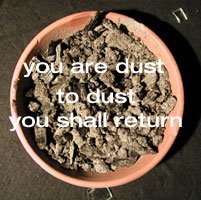
Once again, we go through the annual ritual of Ash Wednesday: we approach the priest or his representative to place ashes on our foreheads while we listen to the words: "Remember that you are dust and unto dust you shall return." A reminder, a warning, an invitation.
It is a reminder: a statement of an undeniable fact: that in the beginning and in the end, we are dust. We are mere earth. The Scriptures attest to this. Genesis tells us how Yahweh formed the first human being from clay, how He breathed life into it, making it a human being. Experience attests to this. We see how a dead body decomposes and turns into a mound of earth after cremation. There is no fable or fiction here: pure fact. From dust to dust.
It is a warning: a warning precisely against making a fable or fiction of who or what we are. Don't we spend much money, much energy, much time turning the fact of our mortality into a fiction? Think of age-resisting creams, death-defying technologies, forever young vitamins peddled to us by media. And we are all-too willing gullibles. In the end, it all comes to dust, inevitably! What a waste, in the end, it all is!
It is an invitation: to turn to God in Jesus Christ, for the real meaning and purpose of human life. Not in the dust, not in the decay, not in the dead, but in Christ, alive and risen. And it is for the joyful celebration of the Easter of His Resurrection that we are actually preparing for in Lent. We are invited "to turn away from sin and believe in the Good News!" The Good News is that the dust of death is not the dead end of the story of our life. The end is the glory of life, with Jesus Risen...
...but only if we follow Him on His way to the Cross!





